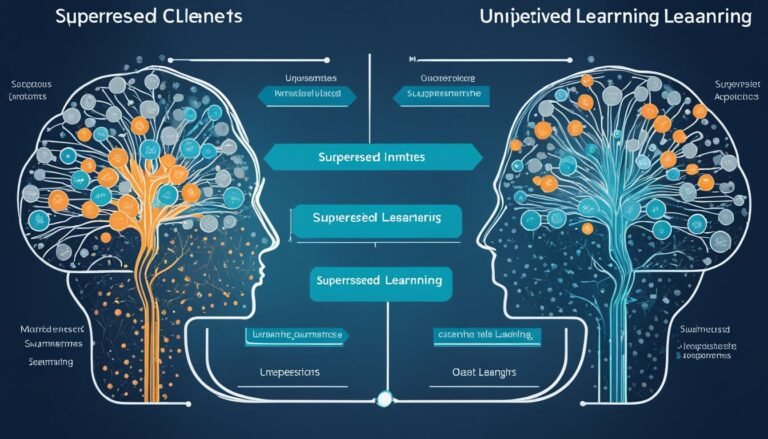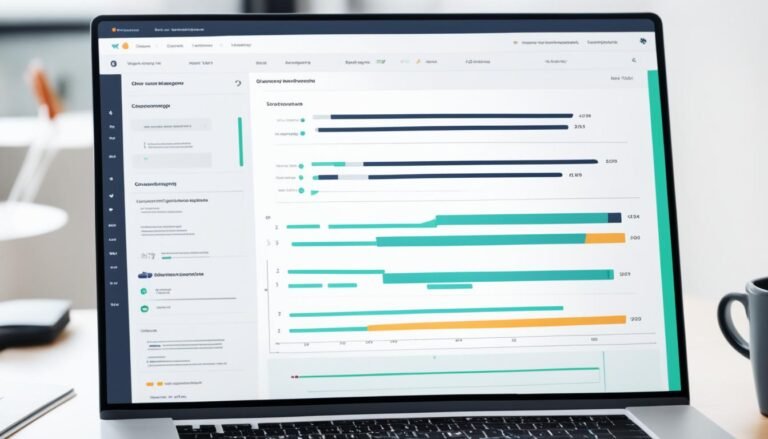The Role of AI in Financial Services: From Fraud Detection to Investment Strategies
Ever wondered how AI changes our financial world?
AI is now a big part of banking and finance. It makes things better for us in many ways. For example, it helps spot fraud, manage our wealth, and even give better customer service. This change is saving banks a lot of money, around $447 billion by 2023-24.
So, AI is not just a buzzword; it’s changing how money moves, grows, and keeps safe.
Key Takeaways
- AI plays a critical role in risk assessment by analyzing extensive data to evaluate credit risks and detect fraudulent activities.
- AI-driven customer service tools, such as chatbots and virtual assistants, offer 24/7 service, enhancing customer satisfaction and operational efficiency.
- AI facilitates high-frequency trading, enabling algorithmic trading to execute orders based on market conditions more swiftly than human traders.
- The integration of AI in finance leads to increased operational efficiency by automating both routine and complex processes, reducing manual intervention, and minimizing errors.
- Advanced AI technologies are utilized by companies like PayPal to analyze transaction data patterns and prevent real-time fraudulent transactions.
Introduction to AI in Financial Services
AI has totally changed how businesses in the money world work. It’s making it possible to save huge amounts of money and work more effectively. By 2023-24, banks are likely to save a combined $447 billion. This big number comes from cutting down on boring jobs and making better decisions with smart help.
What is AI in Finance?
AI in finance uses computers to make choices on their own. It can do things like give each customer a unique service, forecast market changes using deep learning, and catch fraud by spotting unusual patterns. Financial groups work on building smart models. These models learn and get better at solving problems with time.
Historical Context and Evolution
The story of AI in money matters shows a major change. Finance used to be all about traditional banking. But now, it’s turning more and more into a field guided by smart technology. Early on, we saw AI handle simple tasks in banking, like customer questions. But soon after, it took on bigger jobs, such as checking through lots of data to find mistakes in financial papers. This helped speed up things like loan approvals.
The Importance of AI Integration
Getting AI into financial settings is no longer just a choice. It’s a need. Companies in finance can get ahead by using AI to work smarter, serve customers more personally, and stay safe from risks. By leaving the boring work to AI, human experts can focus on stuff that brings more value. Plus, AI can create new and better financial products. This makes customers really happy with their service.
Fraud Detection Using AI
Artificial intelligence is making big changes in how we fight fraud in the financial world. It’s especially important in wealth management. Here, AI tools help spot and stop fraud right when it happens.
Real-Time Fraud Detection Systems
At the heart of protecting banks and their clients, AI systems are acting really fast. They use sophisticated technologies like deep learning and specialized networks. These tools can sift through huge amounts of data quickly, catching unusual activities before they cause big problems.
A good example is American Express, which made its fraud detection 6% better with AI. This shows how AI is key for financial safety.
Analyzing Transaction Data Patterns
AI in finance can now look deeply into transaction patterns to sniff out suspicious stuff. With the help of NVIDIA and other tools, banks can check massive amounts of data without breaking a sweat. Graph neural networks, for example, are great at untangling complex fraud schemes. They can follow the twisted paths fraudsters create, helping stop fraud before it starts.
Protecting Customers with AI
AI is not just about stopping fraud. It’s also about making sure valid transactions don’t get wrongly tagged as fraud. This means happier customers and a better image for the bank. With fraud and attacks increasing fast, AI’s quick action is more important than ever.
AI is also helping banks keep up with rules on knowing their customers and stopping money laundering. It ensures the bank follows the law while putting customer safety first.
Enhancing Customer Experience with AI
In financial services, AI is changing how companies interact with customers. It makes each interaction personal and fast. This shift by incorporating AI changes how we see the future of customer service in finance.
AI-Powered Chatbots
AI chatbots are key in making services more efficient. They answer questions immediately, cutting waiting times by half or more. This lets humans focus on the trickier problems customers might have, improving overall service.
Personalized Customer Interactions
AI excels at personalizing customer interactions in finance. It gathers and uses huge amounts of financial and personal info to recommend specific services or products. This makes the experience more engaging and keeps customers coming back.
Improving Response Times and Customer Satisfaction
Financial companies are rushing to use AI to get quick with customer replies. Many expect AI to boost service and provide instant help. This has already led to happier clients and an increase in those satisfied with the service.
AI constantly learns, making each service experience better than the last. The key to future customer happiness in finance is how well AI meets and surpasses what customers expect.
AI in Investment Strategies
Artificial intelligence (AI) in banking has changed how we invest. Now, banks use AI to make their investment game strong. This tech boosts efficiency and gets the job done more accurately.
Robo-Advisors and Automated Financial Advice
AI has brought us robo-advisors, changing the investing game. These platforms give automatic financial advice just for you. For instance, Spiking from Singapore has made a name using advanced AI. It offers personalized financial help by crunching millions of data bits. This means investors can find solutions that match what they’re looking for.
Predictive Analytics for Market Trends
Then there’s predictive analytics, a big AI tool in banking. It uses big data to guess market moves and prices. This information helps investors make smarter choices, cutting risks and bumping up gains. Companies like Spiking are fully on board, using AI to stay on top of market trends.
Optimizing Investment Portfolios
AI is also busy optimizing investment plans. It keeps an eye on the market and trades better than humans can. AI makes decisions without letting emotions get in the way. It also helps manage risks, making investment safer. These super-smart, automated processes are making financial services more personal, efficient, and available for all.
Thus, AI is key in changing the way we invest today. Its role in banking and finance is game-changing. As AI tech grows, its impact on finance will only get bigger. Those who welcome it stand to gain a lot.
AI in Risk Management and Compliance
AI is changing risk management, helping banks spot and handle financial risks better. With machine learning, banks can look through large amounts of data, find new risk patterns, and make following rules automatic.
Gen AI, a step further, is about to change how banks manage risks in the next few years. For example, McKinsey has created a Gen AI expert who knows a bank’s unique data. This expert gives custom advice, letting banks watch over transactions better, looking for any issues, reading market news, and setting prices accurately.
Identifying and Managing Financial Risks
In banks, Gen AI helps in different areas, like quickly checking credit for customers. It can also watch how well models are working and update old programming languages, making risk managing easier.
Regulatory Compliance and Anti-Money Laundering
AI in finance is key to keeping up with rules. It checks if a bank is following laws and warns about any possible problems early on. Gen AI also helps with AML, making it easier to spot suspicious actions by looking at customer and deal data.
Financial firms are turning to AI for more than just saving money. It’s helping them guess the future better and sort through huge amounts of data when testing for hard times. These steps help keep the financial world safe and sound.
Cost Reduction and Efficiency Gains with AI
AI is now a key player in the financial services world. It helps cut costs and makes processes work better. This happens through automation, saving money on manual work and making things more accurate.
Automating Routine Financial Tasks
AI is making big changes in finance by automating everyday tasks. With AI like Large Language Models, things like compliance, risk management, and customer service are being taken care of. This cuts down on errors, making things smoother and more efficient. It also frees up people to work on bigger picture tasks, boosting productivity.
Operational Efficiency Improvements
AI really boosts how well finance operations run. It makes decisions faster by handling research and reporting. This means insights are quick, helping to manage investments better and get more profits. Plus, using AI cuts over 10% off operating costs, helping firms stay ahead.
Ensuring data is high-quality and using the latest data systems is key for AI to work well. Businesses investing in AI early get a head start, making things work better for both them and their customers. With the right focus on data and systems, finance firms can save money and improve efficiency in the long run.
Case Studies and Real-World Applications
AI is changing finance for the better, proven by real cases. Financial companies are using AI to solve problems and work better.
Fraud Detection in Financial Institutions
Many financial services are focusing on spotting fraud, with 85% using AI to strengthen security. For example, FinSecure Bank saw a 60% drop in fraud in one year. They used AI to check transactions and spot weird events fast.
PayPal also uses AI to watch over money moving around. This quick spotting of oddities helps keep many users safe. It improves safety and trust with their users by cutting down on fraud activities.
AI in Portfolio Management
AI is also helping manage investments better. CapitalGains Investments got their clients more returns, thanks to AI. It makes smarter investment choices by looking at market patterns closely.
EquityPlus Investment uses AI too in managing their assets. This helps them make better choices and meet client goals. It keeps their investments in tune with changing markets.
QuickLoan Financial sped up loan processing and made better choices using AI. They cut down on risk and work faster. It’s an example of AI making finance work smarter for everyone.
AI clearly improves finance, making for better investment moves and smoother operations. Everyone wins, from the companies to their customers.
Conclusion
The impact of AI on finance is huge, changing how we handle money. It’s predicted to save $447 billion by 2023-24. AI does a lot, like spotting fraud and making credit checks better. This makes things safer for customers. It also helps with loans and services through smart chatbots.
Now, AI is even helping to buy and sell stocks quickly by guessing market changes. It also recommends products better by understanding what customers want. Plus, talking to banks or companies can be easy with NLP, either alone or through smart devices.
Overall, using AI in finance lowers costs and makes better decisions. It’s good at finding errors, handling tasks automatically, and speeding up things. AI in finance is just starting. It will keep getting better as it adapts to new challenges in the market. So, the finance world is becoming smarter, ready to face the future with strength and jump on new chances for success.
Source Links
- https://www.linkedin.com/pulse/role-ai-finance-industry-manthan-bhavsar-qsqaf
- https://www.theglobaltreasurer.com/2024/05/29/how-ai-is-paving-the-way-for-a-new-era-in-financial-services/
- https://www.valuecoders.com/blog/technology-and-apps/what-is-the-role-of-artificial-intelligence-in-the-financial-sector/
- https://cloud.google.com/discover/finance-ai
- https://www.emarketer.com/insights/ai-in-finance/
- https://blogs.nvidia.com/blog/ai-fraud-detection-rapids-triton-tensorrt-nemo/
- https://www.gbgplc.com/en/blog/ai-a-key-player-in-financial-institutions-fight-against-fraud/
- https://www.linkedin.com/pulse/ai-enabled-fraud-detection-safeguarding-financial-roy-malhotra-ytnlc
- https://redresscompliance.com/the-future-of-ai-financial-services-customer-experiences/
- https://biztechmagazine.com/article/2023/12/how-ai-shaping-customer-service-financial-services
- https://www.testingxperts.com/blog/ai-in-financial-services
- https://medium.com/@clemenchiang/transforming-finance-the-rise-of-ai-in-investment-strategies-239967d70f58
- https://www.linkedin.com/pulse/role-ai-modern-investment-strategies-assetlinkai-jyzrf
- https://www.mckinsey.com/capabilities/risk-and-resilience/our-insights/how-generative-ai-can-help-banks-manage-risk-and-compliance
- https://kpmg.com/ae/en/home/insights/2021/09/artificial-intelligence-in-risk-management.html
- https://biztechmagazine.com/article/2024/04/how-artificial-intelligence-helps-financial-services-companies-manage-risk
- https://www.finextra.com/blogposting/25363/smart-savings-how-ai-can-drive-cost-reduction-in-financial-services
- https://biztechmagazine.com/article/2024/03/how-ai-can-help-banks-reduce-operational-costs
- https://blog.cloudera.com/accelerating-cost-reduction-ai-making-an-impact-on-financial-services/
- https://www.cprime.com/resources/blog/8-finance-ai-and-machine-learning-use-cases/
- https://digitaldefynd.com/IQ/ai-in-finance-case-studies/
- https://finanteq.com/blog/fintech-trends/the-role-of-artificial-intelligence-in-transforming-financial-services/
- https://onlinedegrees.sandiego.edu/artificial-intelligence-finance/








